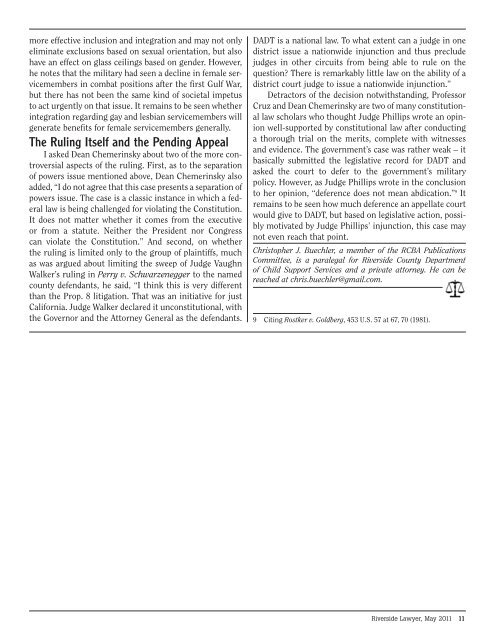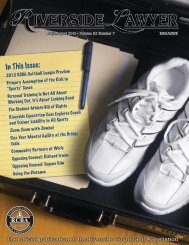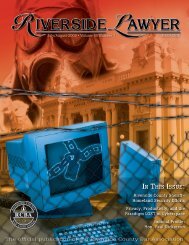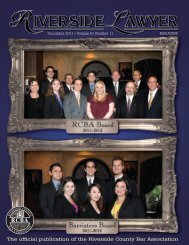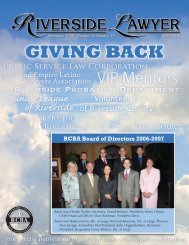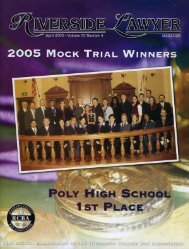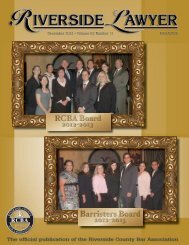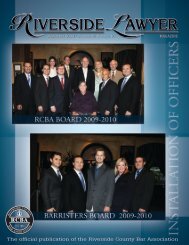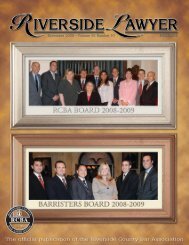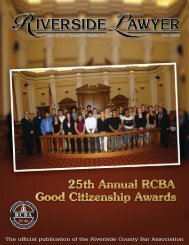In This Issue: - Riverside County Bar Association
In This Issue: - Riverside County Bar Association
In This Issue: - Riverside County Bar Association
You also want an ePaper? Increase the reach of your titles
YUMPU automatically turns print PDFs into web optimized ePapers that Google loves.
more effective inclusion and integration and may not only<br />
eliminate exclusions based on sexual orientation, but also<br />
have an effect on glass ceilings based on gender. However,<br />
he notes that the military had seen a decline in female servicemembers<br />
in combat positions after the first Gulf War,<br />
but there has not been the same kind of societal impetus<br />
to act urgently on that issue. It remains to be seen whether<br />
integration regarding gay and lesbian servicemembers will<br />
generate benefits for female servicemembers generally.<br />
The Ruling Itself and the Pending Appeal<br />
I asked Dean Chemerinsky about two of the more controversial<br />
aspects of the ruling. First, as to the separation<br />
of powers issue mentioned above, Dean Chemerinsky also<br />
added, “I do not agree that this case presents a separation of<br />
powers issue. The case is a classic instance in which a federal<br />
law is being challenged for violating the Constitution.<br />
It does not matter whether it comes from the executive<br />
or from a statute. Neither the President nor Congress<br />
can violate the Constitution.” And second, on whether<br />
the ruling is limited only to the group of plaintiffs, much<br />
as was argued about limiting the sweep of Judge Vaughn<br />
Walker’s ruling in Perry v. Schwarzenegger to the named<br />
county defendants, he said, “I think this is very different<br />
than the Prop. 8 litigation. That was an initiative for just<br />
California. Judge Walker declared it unconstitutional, with<br />
the Governor and the Attorney General as the defendants.<br />
DADT is a national law. To what extent can a judge in one<br />
district issue a nationwide injunction and thus preclude<br />
judges in other circuits from being able to rule on the<br />
question? There is remarkably little law on the ability of a<br />
district court judge to issue a nationwide injunction.”<br />
Detractors of the decision notwithstanding, Professor<br />
Cruz and Dean Chemerinsky are two of many constitutional<br />
law scholars who thought Judge Phillips wrote an opinion<br />
well-supported by constitutional law after conducting<br />
a thorough trial on the merits, complete with witnesses<br />
and evidence. The government’s case was rather weak – it<br />
basically submitted the legislative record for DADT and<br />
asked the court to defer to the government’s military<br />
policy. However, as Judge Phillips wrote in the conclusion<br />
to her opinion, “deference does not mean abdication.” 9 It<br />
remains to be seen how much deference an appellate court<br />
would give to DADT, but based on legislative action, possibly<br />
motivated by Judge Phillips’ injunction, this case may<br />
not even reach that point.<br />
Christopher J. Buechler, a member of the RCBA Publications<br />
Committee, is a paralegal for <strong>Riverside</strong> <strong>County</strong> Department<br />
of Child Support Services and a private attorney. He can be<br />
reached at chris.buechler@gmail.com.<br />
9 Citing Rostker v. Goldberg, 453 U.S. 57 at 67, 70 (1981).<br />
<strong>Riverside</strong> Lawyer, May 2011 11


